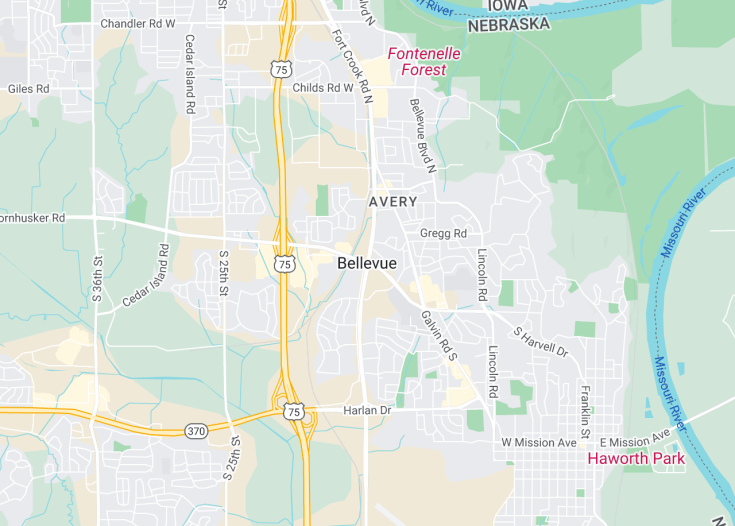Bellevue, Nebraska, is a charming blend of historic allure and modern amenities, making it a unique destination for travelers. Known as the first settlement in Nebraska, Belleville boasts rich cultural heritage sites such as the Fontenelle Forest and Sarpy County Museum. The city offers lush parks, delicious eateries, and scenic walks along the Missouri River, promising a delightful experience for nature lovers, history buffs, and adventure seekers alike.
Explore the Bellevue Berry Farm and Pumpkin Ranch for fun family activities and homegrown produce. A perfect spot for year-round enjoyment!
Don’t miss a serene stroll through the Fontenelle Forest. This nature escape offers over 19 miles of trails amidst ancient trees and diverse wildlife.
Bellevue: The Gateway to the West
| Country | USA |
| Time in Bellevue | GMT-6 |
| Language spoken | English |
| Population | 53,936 (United States Census Bureau) |
| Currency | US Dollar (USD $) |
| Airports |
|
Bellevue, nestled in the picturesque landscapes of Nebraska, holds a unique place in American history as the first settlement in the state. Known historically as the “Birthplace of Nebraska,” this vibrant suburb of Omaha offers a blend of historic charm and modern conveniences. From its humble beginnings as a fur trading post in the 1820s, Bellevue has grown into a thriving community, characterized by its family-friendly environment and strong educational institutions, including Bellevue University.
Where is Bellevue?
Located in eastern Nebraska, Bellevue sits on the Missouri River, just south of Omaha.
Distances:
| Route | Distance by car | Time by car |
|---|---|---|
| Omaha to Bellevue | 9 miles | 15 minutes |
| Lincoln to Bellevue | 53 miles | 1 hour |
| Kansas City to Bellevue | 185 miles | 2 hours 50 minutes |
What is Bellevue famous for?
Bellevue is renowned for its historic sites including the Fontenelle Forest, Sarpy County Historical Museum, and the Bellevue Log Cabin. In addition, it plays a significant educational role, housing Bellevue University, known for its comprehensive online programs.
History
Bellevue, Nebraska, holds a distinctive history that mirrors the broader story of the American Midwest, evolving from native lands into a strategic military post and finally into a thriving suburban community. Each era has added layers to its rich history, contributing to the Bellevue we know today.
Pre-1800s: Native Foundations
Before the arrival of European settlers, the area known today as Belleville was primarily inhabited by Native American tribes, including the Omaha. The Missouri River Valley, in which Bellevue sits, served as a fertile hunting and fishing ground for these tribes, who utilized the land for its rich resources and strategic advantages.
1800s: Settlement and Military Significance
The modern settlement of Bellevue began in the 1820s when fur traders established a trading post here. Notably, Bellevue became the site of Fort Croghan in 1822, later renamed Fort Bellevue, from which the town derives its name. This fort played a key role in the early military and trading activities in the region. By the mid-19th century, Bellevue evolved into a bustling settlement as European immigrants and American settlers were drawn to the area’s opportunities. In 1855, Bellevue was incorporated, marking a significant development in its transition from a military outpost to a civilian town. This period also saw the establishment of the Nebraska Territory, with Bellevue initially considered as a potential territorial capital before Omaha was ultimately chosen.
1900s: Growth and Development
Throughout the 20th century, Bellevue experienced significant growth. The establishment of Offutt Air Force Base in 1924, initially as Fort Croghan, and later expanded during World War II, provided a major economic boost to the area. The Base became a central part of global military operations, especially during the Cold War, contributing to Bellevue’s population and economic growth. The post-war era marked suburban expansion and the growth of local industries and education facilities, including Bellevue University founded in 1966 which further established the town as a regional hub for higher education and innovation.
2000s to Present: Modern Developments
In recent decades, Bellevue has continued to develop and modernize while maintaining its historical heritage. Economic diversification has seen the rise of technology and service sectors, complementing the traditional military and educational industries. Today, Bellevue is recognized for its quality of life, educational institutions, and its role in national defense, preserving its place as an important city in the state of Nebraska.
Visit Bellevue
What to see and do in Bellevue, Nebraska (USA).
Bellevue, Nebraska offers a blend of historical attractions, natural beauty, and modern amenities. Key attractions include the Sarpy County Museum, showcasing local history, and the Fontenelle Forest, a sprawling nature preserve ideal for hiking and wildlife observation. Visitors can also explore the Bellevue Berry Farm and Pumpkin Ranch for a taste of local agriculture and family fun.
- Sarpy County Museum: Dive into local history.
- Fontenelle Forest: Enjoy nature walks and bird watching.
- Bellevue Berry Farm: Pick your own fruits and participate in seasonal activities.
Annual Events in Bellevue
Bellevue hosts several annual events enriching its cultural calendar. The Bellevue Strawberry Festival, held in June, celebrates local agriculture and community spirit. In autumn, the Arrows to Aerospace festival in August commemorates Bellevue’s aviation and military heritage with parades, crafts, and family activities.
Best time to visit Bellevue
The best times to visit Bellevue are during the spring and fall months. These seasons offer mild weather, making it ideal for exploring outdoor attractions and participating in local events.
Is Bellevue worth visiting?
Bellevue, Nebraska, offers a compelling mix of historical depth, natural beauty, and community events that appeal to both history buffs and nature enthusiasts. While it may not feature the bustling nightlife of a major city, its charm lies in its quieter, family-friendly activities and its importance in American military history. Visitors looking for a peaceful getaway with opportunities for learning and leisure will find Bellevage inviting, though those seeking more vibrant urban experiences may need to venture to nearby Omaha.









